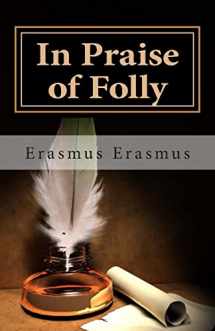
In Praise of Folly
ISBN-13:
9781495447082
ISBN-10:
1495447081
Author:
Erasmus Erasmus
Publication date:
2014
Publisher:
CreateSpace Independent Publishing Platform
Format:
Paperback
84 pages
FREE US shipping
Book details
ISBN-13:
9781495447082
ISBN-10:
1495447081
Author:
Erasmus Erasmus
Publication date:
2014
Publisher:
CreateSpace Independent Publishing Platform
Format:
Paperback
84 pages
Summary
In Praise of Folly (ISBN-13: 9781495447082 and ISBN-10: 1495447081), written by authors
Erasmus Erasmus, was published by CreateSpace Independent Publishing Platform in 2014.
With an overall rating of 4.3 stars, it's a notable title among other
books. You can easily purchase or rent In Praise of Folly (Paperback) from BooksRun,
along with many other new and used
books
and textbooks.
And, if you're looking to sell your copy, our current buyback offer is $0.59.
Description
In Praise of Folly is an essay written in 1509 by Desiderius Erasmus of Rotterdam and first printed in 1511. The essay was inspired by De Triumpho Stultitiae, written by Italian humanist Faustino Perisauli, born at Tredozio, near Forlì. Erasmus revised and extended the work, which he originally wrote in the space of a week while sojourning with Sir Thomas More at More's estate in Bucklersbury. In Praise of Folly is considered one of the most notable works of the Renaissance and one of the catalysts of the Protestant Reformation. It starts off with a satirical learned encomium after the manner of the Greek satirist Lucian, whose work Erasmus and Sir Thomas More had recently translated into Latin, a piece of virtuoso foolery; it then takes a darker tone in a series of orations, as Folly praises self-deception and madness and moves to a satirical examination of pious but superstitious abuses of Catholic doctrine and corrupt practices in parts of the Roman Catholic Church—to which Erasmus was ever faithful—and the folly of pedants (including Erasmus himself). Erasmus had recently returned disappointed from Rome, where he had turned down offers of advancement in the curia, and Folly increasingly takes on Erasmus' own chastising voice. The essay ends with a straightforward statement of Christian ideals. Erasmus was a good friend of More, with whom he shared a taste for dry humor and other intellectual pursuits. The title "Moriae Encomium" can also be read as meaning "In praise of More". The double or triple meanings go on throughout the text. The essay is filled with classical allusions delivered in a style typical of the learned humanists of the Renaissance. Folly parades as one of the gods, offspring of Plutos and Freshness and nursed by Inebriation and Ignorance, whose faithful companions include Philautia (self-love), Kolakia (flattery), Lethe (oblivion), Misoponia (laziness), Hedone (pleasure), Anoia (madness), Tryphe (wantonness), Komos (intemperance) and Eegretos Hypnos (dead sleep).


We would LOVE it if you could help us and other readers by reviewing the book
Book review

Congratulations! We have received your book review.
{user}
{createdAt}
by {truncated_author}


